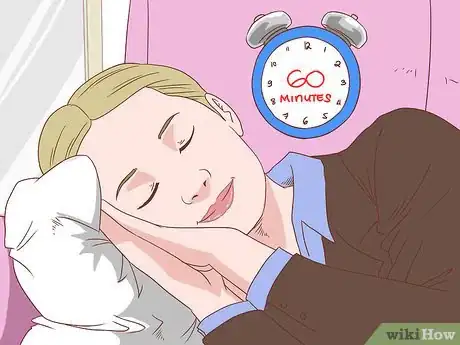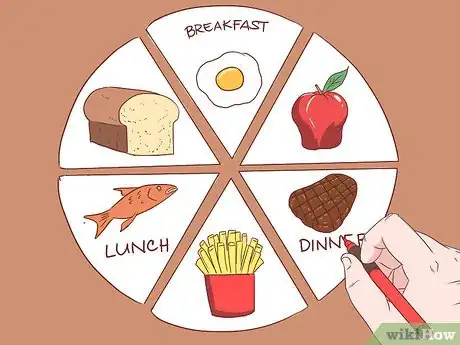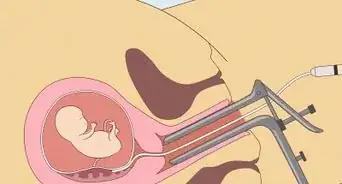This article was medically reviewed by Lacy Windham, MD. Lacy Windham, MD, is a Board-Certified Obstetrician & Gynecologist in Cleveland, Tennessee. Dr. Windham attended medical school at the University of Tennessee Health Science Center in Memphis. Her residency was completed at Eastern Virginia Medical School in Norfolk, Virginia. She was the recipient of multiple awards during her residency training, including Most Outstanding Resident in Maternal Fetal Medicine, Most Outstanding Resident in Oncology, Most Outstanding Resident Overall, and Special Award in Minimally Invasive Surgery.
There are 29 references cited in this article, which can be found at the bottom of the page.
This article has been viewed 196,781 times.
Most expectant mothers will experience chronic fatigue during some of their pregnancy, usually in their first and third trimester. If you feel too tired to do anything, there are ways you can combat this fatigue. You can maintain energy levels by exercising, getting proper nutrition, sleeping well, and getting enough fluids. Of course, you should always consult with your doctor before making changes to your diet or activity level during pregnancy. Keep reading to learn more about how to gain energy during pregnancy.
Steps
Exercising
-
1Exercise. See your doctor to rule out any possible reasons to not exercise. If your doctor approves, get plenty of daily moderate exercise. It is recommended that pregnant women get at least 30 minutes of moderate exercise every day.[1] There are no heart rate limitations on the exercise you can do. Make sure you can still talk normally while working out. If you are breathing too heavily to talk, you are probably working too hard.[2]
- During your third trimester, it is safe to exercise as long as you are not at risk of delivering a preterm baby. If you usually do moderate or high-impact exercise, discuss if you can continue as usual with your doctor or midwife. Try prenatal yoga, brisk walking, along with abdominal and back exercises. Since you can't do crunches on your back, do standing pelvic tilts. This late in pregnancy, you should avoid lifting heavy weights. And as always, stop if you feel dizzy or lightheaded.[3] If you are tired, try short bursts of exercise instead of one long exercise.[4]
- Exercise helps keep your heart, lungs, and muscles healthy, and ensures you get plenty of oxygen to your brain and other organs.
- If you will be exercising at an altitude, be aware that acute mountain sickness (AMT) is a risk. Give yourself time to get used to the altitude if you travel to a location that is above 2500 meters. Wait two or three days before doing any moderate exercise.
- Resistance exercises are safe, but use light weights and complete a large number of repetitions (e.g. 15-20 repetitions).[5]
-
2Walk. Make time each day to go for a walk. Go for a walk during your lunch break, take the dog for a walk, or set aside time to walk with a walking partner after you get home from work. Walking is important because it increases blood flow, which boosts energy.[6]
- When walking, keep it slow. You don't want to raise your heart rate so you huff and puff. Only engage in a light walk.
- Try for at least a 30 minute walk every day.[7]
Advertisement -
3Lift weights. Strength training while pregnant can be a great way to get safe exercise. However, you will want to use lighter weights. Your center of gravity is changing and you may have trouble supporting a lot of weight. In stead of choosing heavy weights, use light weights and do 15-20 repetitions per set.[8]
- Work on creating upper body strength while pregnant. Do bicep curls, tricep extensions, and shoulder presses. It'll help you when you're lifting your baby later.
-
4Go swimming. Swimming is considered one of the safest exercises for pregnant women. It doesn't add extra stress to your joints or get you too heated as you work out. This is a great, refreshing way to get your blood pumping and wake your body up.[9]
- Splashing your body with cool water refreshes instantly, which can help boost your energy levels.[10]
-
5Try cardio machines at the gym. Half an hour on cardio machines at your local gym can help boost your energy levels. A stationary bike is a good, safe way to exercise. The bike supports your weight, and because it's stationary, you don't risk falling off. A stair-climber, elliptical, and treadmill also are good ways to exercise and fight fatigue.[11]
- Just be aware that some activities may require special adjustments to keep you and your baby safe. If you are not sure if an exercise is okay, talk to your doctor to be sure.[12]
-
6Do yoga. There are many yoga routines geared towards pregnant women, and many of them aim to help raise energy levels. Go to a yoga class at your local gym or yoga studio. Look online or buy a DVD of pregnancy yoga routines so you can fit a half hour of yoga into your day whenever you have a spare moment.
- Some studios and gyms offer classes specifically for pregnant women.[13]
-
7Dance. A good way to boost your energy, your endorphins, and your overall mood is to put on some upbeat tunes and dance. Increasing your endorphins helps reduce stress, which can cause fatigue.[14]
- Make sure you don't do too much jumping, leaping, or spinning.
-
8Fight the midday slump with movement. If you are at work and just can't seem to wake up, try doing spurts of light movement. Do a few stretches and breathing exercises at your desk, take a walk around the office, or step outside for some fresh air and sunshine.[15]
Getting Enough Rest
-
1Get the right amount of sleep. Getting enough rest during pregnancy is important to have more energy during pregnancy. Proper rest means getting 8-9 uninterrupted hours of sleep every night. However, 78% of pregnant women report that they have trouble sleeping.[16]
-
2Change your bedtime. Because your body will be expending more energy, and you will feel more tired during your first and last trimester, you should start going to bed earlier than normal. Getting these few extra hours of sleep every night will help you not feel so tired during the day.[19]
-
3Take naps. When you feel tired during the day, take a short nap. Naps should only last 20 to 30 minutes to reap the full effects, but a 60-minute power nap can refresh you. Even if you are at work, take a 10 to 15 minute break, turn out the light, close your eyes, and rest your head.[20]
- A daily nap can be especially helpful during the first trimester because you are likely to be fatigued on most days.
-
4Shift your position when you constantly feel the need to urinate. One way to help you sleep is to shift your body so the baby moves away from your bladder. Try raising yourself up on all fours for a few minutes. This can help move the baby, and hopefully, lessen the urge to urinate.[21]
-
5Use a pillow to help joint discomfort. If you are experiencing pain when you sleep on your side, then try placing a pillow between your knees. This can help with lower back and hip pain. You can also place a pillow behind your back for added support.[22]
- You can also purchase a body pillow to help support your body while sleeping on your side.
-
6Cut out unnecessary commitments. When you are feeling overly tired, you may need to let some things go to focus on yourself. This may mean reducing your social commitments, or adjusting them. Let the housework go. See if you can work from home. Your rest and sleep is more important than dinner with friends, a PTA meeting, or a load of laundry.[23]
-
7Reduce your stress. Some stress is normal during pregnancy, but too much stress can make it hard to sleep at night. It can also cause headaches and changes in your appetite.[24] Take time for yourself during your pregnancy. Do whatever it is you need to do to reduce stress. Read a book, listen to your favorite song, do yoga, or sit outside in the sunshine.
- Try meditation. Close your eyes and clear your mind of all other thoughts. Focus just on a single image or thought for a few minutes a day.
- Practice deep breathing. Take deep breaths for 2 minutes. This can help calm you and restore your energy.
- Talk to your doctor if you are having a hard time managing your stress.[25]
Eating the Right Foods
-
1Spread your food over multiple meals. You need about 300 more calories per day when you are pregnant, which may slow you down if you consume large meals.[26] A way to get the nutrients you need to stay energized is to eat 5-6 small meals throughout the day. This helps even out your energy and helps you avoid crashes.
- In addition to breakfast, lunch, and dinner, have at least 2 substantial healthy and nutritious snacks throughout the day to keep your energy up.[27]
-
2Eat protein. Protein is a great way to get energy that lasts throughout the day. Plus, the amino acids found in foods containing protein help aid in the development of your baby's cells. When you are pregnant, you need 75 grams (2.6 oz) per day. Good sources of protein include:
- milk, cheese, yogurt, and other dairy products
- eggs
- lean meats, such as chicken and fish
- tofu or soy, like edamame
- beans or lentils
- quinoa
- hummus
- nuts and seeds[28]
-
3Incorporate complex carbs. Healthy complex carbohydrates are important during pregnancy. They help fuel you while nourishing your baby. Stay away from refined, processed carbs, like snack cakes and chips, and skip the white bread. Choose instead:
- oatmeal
- fresh or dried fruit (with no added sugar)
- fresh vegetables
- whole grain bread, crackers, and cereal
- baked potatoes with skin
- beans and peas[29]
-
4Add in iron. Iron-rich foods help prevent anemia, which can cause fatigue and be a problem during pregnancy. Eating an iron-rich diet can help keep your energy levels high. Eat the following foods:
- hummus
- iron-rich cereals
- dried fruit (with no added sugar)
- spinach, kale, and other dark leafy greens
- soy products
- lean red meat
- beans[30]
-
5Get the proper vitamins. Eating foods rich in energy-boosting vitamins can help you fight fatigue throughout the day. Try the following foods:
- Pumpkin is a great source of vitamin A.
- Yogurt provides calcium and vitamin D. Make sure to get yogurt without artificial ingredients, preservatives, and added sugars.[31]
- Broccoli and carrots are great sources of beta carotene, and broccoli, citrus, and berries are a tasty way to get vitamin C.
- Blueberries, blackberries, and strawberries provide important antioxidants, along with other essential vitamins.
- B6 is an important nutrient found in chicken, sweet potatoes, and bananas.
-
6Eat potassium. Potassium-rich foods in your diet can help your muscles by helping reduce leg cramps. Potassium can be found in the following foods:
- bananas
- pumpkin
- peaches
- kiwis
- potatoes
- leafy greens[32]
-
7Get enough magnesium. Magnesium breaks down sugars into usable energy. If magnesium levels are too low, you can feel fatigue. Low magnesium levels may also cause leg cramps, but getting enough magnesium can help prevent them. Women should have around 300 mg a day.
- A handful of nuts, like almonds, hazelnuts, or cashews, can help you get your daily dosage.
- Bran cereal, or any whole grains, can provide magnesium.
- Fish is a good source of magnesium. Try halibut.[33]
-
8Avoid sugar. Balanced blood sugar levels help keep you energized. Eating sugary foods spike your blood sugar, giving you a short burst of energy followed by a fatigue causing crash.[34]
- If you need a sweet fix, try fruit, dark chocolate, or granola.
-
9Add more calories to your diet. When pregnant, you should eat a healthy, nutritious diet, along with making sure you don't gain too much weight. However, because your body is hard at work developing your baby, you need extra calories. Add in 300 extra calories to your normal daily food intake to compensate for the extra work your body is doing. Eating under that will cause fatigue and depleted energy levels.
-
10Drink plenty of water. Drinking enough water during pregnancy is vital. During this time, drink 8, 8-oz. (23.7 ml) glasses of water. Milk, juice, and other beverages count towards this number.[35]
- Dehydration can lead to fatigue and other health problems. Conversely, getting enough water will help you retain stamina and energy.[36]
-
11Drink caffeine wisely. Recent research has shown that it's safe to have a moderate amount of caffeine a day while pregnant. If you need a morning boost or a midday pick-me-up, drink a cup of coffee or tea - while carefully monitoring your intake of caffeine.[37] Do not exceed 200 milligrams of caffeine per day, the amount of caffeine in about 12 ounces of coffee.[38]
- However, if you are finding yourself having trouble sleeping, try to stay away from coffee, soda, and tea. Caffeine is a stimulant that can interfere with your sleep. Don't drink caffeine too late in the day.[39] Caffeine can stay in the system for many hours and interfere with sleep.
Looking For Underlying Medical Conditions
-
1Check for anemia. When you're pregnant, your body produces more blood, increasing the need for more iron.[40] If you are not getting enough iron or other nutrients, you might end up anemic. Having mild anemia when you are pregnant is common. But chronic fatigue may point to severe anemia from low iron or vitamin levels.[41]
- Many of symptoms of anemia are also common symptoms of a normal pregnancy such as fatigue, shortness of breath, and trouble concentrating. Ask your doctor to do a blood test to see if your fatigue is due to anemia.[42]
-
2Decide if you have depression. During pregnancy, you might feel tired, run-down, low, and hopeless. Chronic fatigue can be a symptom of depression. If you feel tired, hopeless, and have lost interest in things you normally enjoy, speak to your doctor or midwife to rule out depression.[43]
-
3Get your thyroid checked. Hypothyroidism is an underactive thyroid. Having hypothyroidism can cause complications such as miscarriage, stillbirth, infertility, and other problems. The American Association of Clinical Endocrinologists state that 1 in 10 Americans suffer from thyroid disease and over 13 million are undiagnosed. Get your doctor to check you for thyroid problems early in your pregnancy.[44]
-
4Get tests run. If you are unsure why you are still so tired, go to the doctor and get tests run. This way you rule out any serious underlying medical conditions.[45]
References
- ↑ http://www.ajog.org/article/S0002-9378(14)00570-5/abstract?cc=y=
- ↑ http://www.mayoclinic.org/healthy-lifestyle/pregnancy-week-by-week/expert-answers/exercise-during-pregnancy/faq-20058359
- ↑ http://www.fitpregnancy.com/pregnancy/pregnancy-health/all-about-third-trimester
- ↑ http://www.parents.com/pregnancy/week-by-week/38/late-pregnancy-exercise/
- ↑ https://www.cabdirect.org/cabdirect/abstract/20153163989
- ↑ https://www.modernghana.com/lifestyle/2187/16/18-ways-to-beat-pregnancy-fatigue.html
- ↑ http://americanpregnancy.org/your-pregnancy/fatigue-during-pregnancy/
- ↑ https://www.cabdirect.org/cabdirect/abstract/20153163989
- ↑ http://americanpregnancy.org/pregnancy-health/exercise-and-pregnancy/
- ↑ https://www.modernghana.com/lifestyle/2187/16/18-ways-to-beat-pregnancy-fatigue.html
- ↑ http://americanpregnancy.org/pregnancy-health/exercise-and-pregnancy/
- ↑ https://www.cabdirect.org/cabdirect/abstract/20153163989
- ↑ http://americanpregnancy.org/pregnancy-health/exercise-and-pregnancy/
- ↑ http://www.skinnymom.com/energy-boosting-tips-during-pregnancy/
- ↑ http://www.urmc.rochester.edu/encyclopedia/content.aspx?ContentTypeID=134&ContentID=4
- ↑ http://sleepfoundation.org/sleep-news/sleeping-the-trimesters-1st-trimester
- ↑ http://www.babycenter.com/0_fatigue-during-pregnancy_2911.bc
- ↑ http://www.mayoclinic.org/healthy-lifestyle/pregnancy-week-by-week/expert-answers/leg-cramps-during-pregnancy/faq-20057766
- ↑ http://www.babycenter.com/0_fatigue-during-pregnancy_2911.bc
- ↑ http://www.webmd.com/women/features/10-energy-boosters?page=2
- ↑ https://www.modernghana.com/lifestyle/2187/16/18-ways-to-beat-pregnancy-fatigue.html
- ↑ https://www.modernghana.com/lifestyle/2187/16/18-ways-to-beat-pregnancy-fatigue.html
- ↑ http://www.babycenter.com/0_fatigue-during-pregnancy_2911.bc
- ↑ http://www.marchofdimes.org/pregnancy/stress-and-pregnancy.aspx
- ↑ http://www.marchofdimes.org/pregnancy/stress-and-pregnancy.aspx
- ↑ https://www.nlm.nih.gov/medlineplus/ency/patientinstructions/000584.htm
- ↑ http://www.whattoexpect.com/pregnancy/eating-well/week-9/energy-sources.aspx
- ↑ http://www.whattoexpect.com/pregnancy/eating-well/week-9/energy-sources.aspx
- ↑ http://www.skinnymom.com/energy-boosting-tips-during-pregnancy/
- ↑ http://www.whattoexpect.com/pregnancy/eating-well/week-9/energy-sources.aspx
- ↑ http://www.babycenter.com/0_10-energy-boosting-foods_10352389.bc
- ↑ https://www.parents.com/pregnancy/my-body/nutrition/15-pregnancy-power-foods1/
- ↑ http://www.babymed.com/food-and-nutrition/six-energy-alternatives-during-pregnancy
- ↑ http://www.webmd.com/women/features/10-energy-boosters?page=3
- ↑ http://www.babycenter.com/404_how-much-water-should-i-drink-while-im-pregnant_5283.bc
- ↑ http://www.webmd.com/women/features/10-energy-boosters?page=3
- ↑ http://americanpregnancy.org/pregnancy-health/caffeine-during-pregnancy/
- ↑ http://americanpregnancy.org/pregnancy-health/caffeine-during-pregnancy/
- ↑ http://www.urmc.rochester.edu/encyclopedia/content.aspx?ContentTypeID=134&ContentID=4
- ↑ http://www.hematology.org/Patients/Anemia/Pregnancy.aspx
- ↑ http://www.webmd.com/baby/guide/anemia-in-pregnancy
- ↑ http://www.hematology.org/Patients/Anemia/Pregnancy.aspx
- ↑ http://www.babycentre.co.uk/a2911/tiredness-in-pregnancy
- ↑ http://hypothyroidmom.com/what-every-pregnant-woman-needs-to-know-about-hypothyroidism/
- ↑ http://www.webmd.com/baby/coping-with-pregnancy-fatigue-twins
About This Article
To gain energy during pregnancy, exercise for at least 30 minutes a day by getting some fresh air outside, swimming or doing light stretches. If you’re not sure whether an activity is safe for you and your baby, talk to your doctor about your concerns. Additionally, to maintain your energy levels, eat foods like lean red meat and kale, since they’re rich in iron and help prevent anemia. If you aren’t already, drink at least 8 glasses of water a day since this will help you retain energy and stamina. For more advice from our Medical co-author, including how to gain energy by taking naps, keep reading!




























































































Medical Disclaimer
The content of this article is not intended to be a substitute for professional medical advice, examination, diagnosis, or treatment. You should always contact your doctor or other qualified healthcare professional before starting, changing, or stopping any kind of health treatment.
Read More...